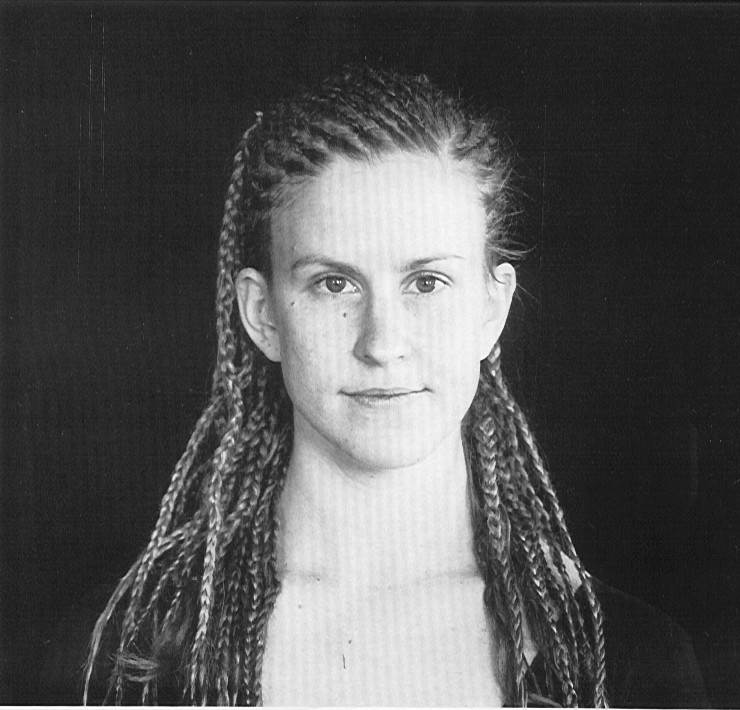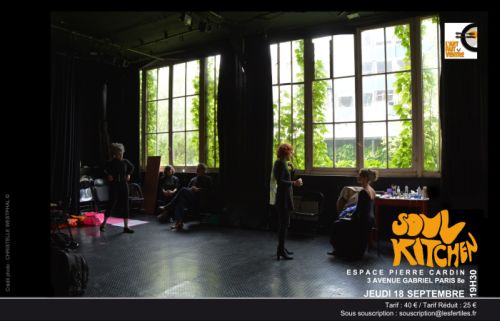Welcome !
|

|
WWW.KALOSKAISOPHOS.ORG
is the website of Mon Oncle D'Amérique Productions, an
"association loi 1901" based in Paris presenting the
artistic collaborations of American choreographer Clara Gibson
Maxwell since 1987.
|

|
| photo
Mariana Cook |
|
photo Johannes Von Saurma
|
EN CLÔTURE DE L’EXPOSITION
“L’ART FAIT VENTRE”
LE MUSÉE DE LA POSTE PRÉSENTE
“SOUL KITCHEN”
ESPACE PIERRE CARDIN
3 AVENUE GABRIEL PARIS 8e
JEUDI 18 SEPTEMBRE – 19H30
TARIF : 40€ / TARIF RÉDUIT : 25 € (CODE: MODA)
SOUS SOUSCRIPTION
souscription@lesfertiles.fr
CLIQUEZ SUR L’IMAGE CI-DESSOUS

WHY
WWW.KALOSKAISOPHOS.ORG?
In
ancient Greek, "Kalos" meant "Beautiful" and
"Sophos" meant "Wise." We do not claim to be or to
incarnate "Beauty" and "Wisdom," but our creative
collective efforts are directed toward those "ends," motivated
and furthered by the love thereof. The love of Beauty and Truth is the
first condition of possibility for their imaginative re-creation, just
as the practice thereof gives one a taste of and for that love.
In the Funeral Oration from The History of the Peloponnesian
Wars (2.40), Thucydides reports Pericles declaring:
Philokaloumen te gar met ' euteleias
kai philosophoumen aneu malakias.
An initial (overly literal) shot at a translation:
For we love beauty, but with good purpose,
and we love wisdom in a way that does not make us soft.
The
English philosopher Thomas Hobbes had offered this translation c. 1628:
"For
we also give ourselves to bravery, and yet with thrift;
and to
philosophy, and yet without molification of the mind."
His
editor, David Grene, comments: "This is a magnificent
seventeenth-century sentence, but liable to misconstruction by a modern
reader. In our idiom the literal rendering is:
We are lovers of beauty, but with cheapness;
we are
lovers of culture, but without softness."
Grene
goes on to explain that Hobbes translated Thucydides' great work
"in order that the follies of the Athenian Democrats should be
revealed to his compatriots." Nevertheless, Hobbes the political
absolutist offered us this "magnificent seventeenth-century
translation" of his--one that admirably expresses the ideals of the
Athenian democracy, despite his contempt for them.
The twentieth-century philosopher Hannah Arendt also reflected--more
sympathetically, yet even more idiosyncratically than Hobbes did--on
this famous passage:
We love beauty within the limits of political judgment,
and we
philosophize without the barbarian vice of effiminacy."
In
her text "The Crisis in Culture," where this translation is
offered, Arendt's main concern was to reconcile "the
Greeks"--who, she believed, were cultureless--with Cicero and
Immanuel Kant by showing how "the Greeks" preceded these two
of her favorite thinkers in the linking of "politics" and
"art." But she also sought to highlight the differences
between "the Greeks" and, on the one hand, "the
Romans" (the latter are said to have originated culture) and, on
the other hand, "the barbarians" (the latter are said to be
viewed by the Greeks as softened by despotism)--not to appreciate the
possible connection between philosophy, democracy, and art in
ancient Athens, where this Funeral Oration was composed. Arendt thus
provides no hint that Pericles' Funeral Oration was spoken in Athens
amid a generation-long struggle of the democratic poleis
against the Spartan-led oligopolies of the time. The contrast the
Corinthians made elsewhere (1.70) between the hesitant and indecisive
Spartans, on the one hand, and the Athenians who saw no contradiction
between thought, feeling, and action, on the other, is missed entirely.
And, finally, she misconstrued the Greek "middle voice" of philokaloumen
and philosophoumen, speaking of the "love of
beautiful things" and "philosophizing" each as "an
activity" (action being one of her primary philosophical
categories), rather than as a a kind of self-transformative (and
society-transforming) process, wherein the collective passion for
democracy would be as important as any action undertaken by
individuals, great or otherwise.
The late social and political thinker, Cornelius Castoriadis, offered an
in-depth reflection upon the meaning of this phrase while criticizing
Arendt's interpretation thereof. It is worth quoting this discussion in
extenso, for here the intimate and crucial connection between
philosophy, democracy, and art is appreciated in full:
The substantive conception of democracy in Greece can be seen clearly in
the entirety of the works of the polis in general. It has been
explicitly formulated with unsurpassed depth and intensity in the most
important political monument of political thought I have ever read, the
Funeral Speech of Pericles (Thuc. 2.35-46). It will always remain
puzzling to me that Hannah Arendt, who admired this text and supplied
brilliant clues for its interpretation, did not see that it offers a substantive
conception of democracy hardly compatible with her own. In the Funeral
Speech, Pericles describes the ways of the Athenians (2.37-41) and
presents in a half-sentence (beginning of 2.40) a definition of what is,
in fact, the "object" of this life. The half-sentence in
question is the famous Philokaloumen gar met'euteleias kai
philosophoumen aneu malakias. In "The Crisis in Culture"
Hannah Arendt offers a rich and penetrating commentary of this phrase.
But I fail to find in her text what is, to my mind, the most important
point. Pericles' sentence is impossible to translate into a modern
language. The two verbs of the phrase can be rendered literally by
"we love beauty . . . and we love wisdom . . .," but the
essential would be lost (as Hannah Arendt correctly saw). The verbs do
not allow this separation of the "we" and the
"object"—beauty or wisdom—external to this "we."
The verbs are not "transitive," and they are not even simply
"active": they are at the same time "verbs of
state." Like the verb to live, they point to an
"activity" which is at the same time a way of being or rather
the way by means of which the subject of the verb is. Pericles does not
say we love beautiful things (and put them in museums), we love wisdom
(and pay professors or buy books). He says we are in and by the love of
beauty and wisdom and the activity this love brings forth, we live by
and with and through them—but far from extravagance, and far from
flabbiness. This is why he feels able to call Athens paideusis—the
education and educator—of Greece. In the Funeral Speech, Pericles
implicitly shows the futility of the false dilemmas that plague modern
political philosophy and the modern mentality in general: the
"individual" versus "society," or "civil
society" versus "the State." The object of the
institution of the polis is for him the creation of a human
being, the Athenian citizen, who exists and lives in and through the
unity of these three: the love and "practice" of beauty, the
love and "practice" of wisdom, the care and responsibility for
the common good, the collectivity, the polis ("they died
bravely in battle rightly pretending not to be deprived of such a polis,
and it is understandable that everyone among those living is willing to
suffer for her" 2.41). Among the three, there can be no separation;
beauty and wisdom such as the Athenians loved them and lived them could
exist only in Athens. The Athenian citizen is not a "private
philosopher," or a "private artist," he is a citizen for
whom philosophy and art have become ways of life. This, I think, is the
real, materialized, answer of ancient democracy to the question about
the "object" of the political institution. When I say that the
Greeks are for us a germ, I mean, first, that they never stopped
thinking about this question: What is it that the institution of society
ought to achieve? And second, I mean that in the paradigmatic case,
Athens, they gave this answer: the creation of human beings living with
beauty, living with wisdom, and loving the common good.
REFERENCES:
Thucydides.
The Peloponnesian War. 2 vols. Trans. Thomas Hobbes. Ed. David
Grene. With an introduction by Bertrand de Jouvenel. Ann Arbor: The
University of Michigan Press, 1959.
Hannah
Arendt. "The Crisis in Culture." Between Past and Future:
Six Exercises in Political Thought. New York: The Viking Press,
1961.
Cornelius
Castoriadis. "The Greek Polis and the Creation of
Democracy" (1983). Philosophy, Politics, Autonomy. Ed. David
Ames Curtis. New York: Oxford University Press, 1991.
















